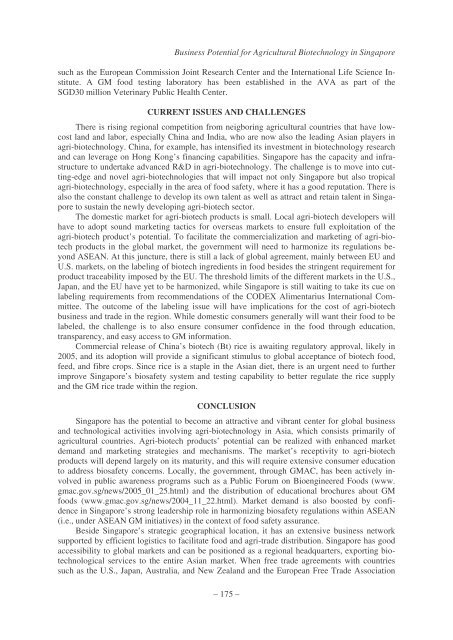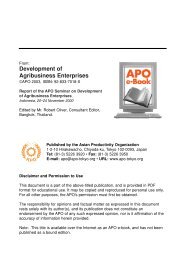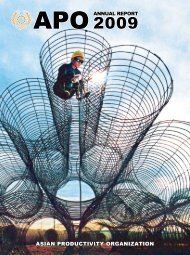Business Potential for Agricultural Biotechnology - Asian Productivity ...
Business Potential for Agricultural Biotechnology - Asian Productivity ...
Business Potential for Agricultural Biotechnology - Asian Productivity ...
Create successful ePaper yourself
Turn your PDF publications into a flip-book with our unique Google optimized e-Paper software.
<strong>Business</strong> <strong>Potential</strong> <strong>for</strong> <strong>Agricultural</strong> <strong>Biotechnology</strong> in Singapore<br />
such as the European Commission Joint Research Center and the International Life Science Institute.<br />
A GM food testing laboratory has been established in the AVA as part of the<br />
SGD30 million Veterinary Public Health Center.<br />
CURRENT ISSUES AND CHALLENGES<br />
There is rising regional competition from neigboring agricultural countries that have lowcost<br />
land and labor, especially China and India, who are now also the leading <strong>Asian</strong> players in<br />
agri-biotechnology. China, <strong>for</strong> example, has intensified its investment in biotechnology research<br />
and can leverage on Hong Kong’s financing capabilities. Singapore has the capacity and infrastructure<br />
to undertake advanced R&D in agri-biotechnology. The challenge is to move into cutting-edge<br />
and novel agri-biotechnologies that will impact not only Singapore but also tropical<br />
agri-biotechnology, especially in the area of food safety, where it has a good reputation. There is<br />
also the constant challenge to develop its own talent as well as attract and retain talent in Singapore<br />
to sustain the newly developing agri-biotech sector.<br />
The domestic market <strong>for</strong> agri-biotech products is small. Local agri-biotech developers will<br />
have to adopt sound marketing tactics <strong>for</strong> overseas markets to ensure full exploitation of the<br />
agri-biotech product’s potential. To facilitate the commercialization and marketing of agri-biotech<br />
products in the global market, the government will need to harmonize its regulations beyond<br />
ASEAN. At this juncture, there is still a lack of global agreement, mainly between EU and<br />
U.S. markets, on the labeling of biotech ingredients in food besides the stringent requirement <strong>for</strong><br />
product traceability imposed by the EU. The threshold limits of the different markets in the U.S.,<br />
Japan, and the EU have yet to be harmonized, while Singapore is still waiting to take its cue on<br />
labeling requirements from recommendations of the CODEX Alimentarius International Committee.<br />
The outcome of the labeling issue will have implications <strong>for</strong> the cost of agri-biotech<br />
business and trade in the region. While domestic consumers generally will want their food to be<br />
labeled, the challenge is to also ensure consumer confidence in the food through education,<br />
transparency, and easy access to GM in<strong>for</strong>mation.<br />
Commercial release of China’s biotech (Bt) rice is awaiting regulatory approval, likely in<br />
2005, and its adoption will provide a significant stimulus to global acceptance of biotech food,<br />
feed, and fibre crops. Since rice is a staple in the <strong>Asian</strong> diet, there is an urgent need to further<br />
improve Singapore’s biosafety system and testing capability to better regulate the rice supply<br />
and the GM rice trade within the region.<br />
CONCLUSION<br />
Singapore has the potential to become an attractive and vibrant center <strong>for</strong> global business<br />
and technological activities involving agri-biotechnology in Asia, which consists primarily of<br />
agricultural countries. Agri-biotech products’ potential can be realized with enhanced market<br />
demand and marketing strategies and mechanisms. The market’s receptivity to agri-biotech<br />
products will depend largely on its maturity, and this will require extensive consumer education<br />
to address biosafety concerns. Locally, the government, through GMAC, has been actively involved<br />
in public awareness programs such as a Public Forum on Bioengineered Foods (www.<br />
gmac.gov.sg/news/2005_01_25.html) and the distribution of educational brochures about GM<br />
foods (www.gmac.gov.sg/news/2004_11_22.html). Market demand is also boosted by confidence<br />
in Singapore’s strong leadership role in harmonizing biosafety regulations within ASEAN<br />
(i.e., under ASEAN GM initiatives) in the context of food safety assurance.<br />
Beside Singapore’s strategic geographical location, it has an extensive business network<br />
supported by efficient logistics to facilitate food and agri-trade distribution. Singapore has good<br />
accessibility to global markets and can be positioned as a regional headquarters, exporting biotechnological<br />
services to the entire <strong>Asian</strong> market. When free trade agreements with countries<br />
such as the U.S., Japan, Australia, and New Zealand and the European Free Trade Association<br />
– 175 –
















